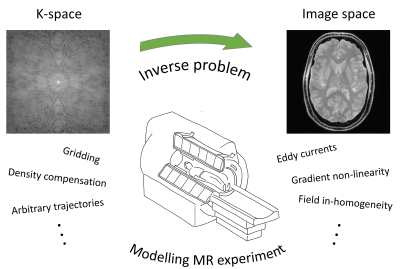Weekend Course
Image Reconstruction: Theory, Methods & Practical Considerations
Joint Annual Meeting ISMRM-ESMRMB & ISMRT 31st Annual Meeting • 07-12 May 2022 • London, UK

| Basics of MRI & Parallel Imaging | |||
| 07:45 |  |
Basics of MRI Reconstruction: k-Space & Inverse Problems
Maria Engel
In this talk, we look at inverse problems in MR image reconstruction and how to tackle them. We start off with the spatial frequency concept (k-space), which is pivotal for acquisition and reconstruction. We look at different ways of traversing k-space in 2D and 3D and their pros and cons for various applications. We review hardware limitations and ways to account for different k-space trajectories at the image reconstruction stage. We will also investigate the handling of static and dynamic magnetic field inhomogeneities in image reconstruction.
|
|
| 08:10 | Parallel Imaging & Simultaneous Multislice Reconstruction
Julia Velikina
The objective of this presentation is to provide an overview of parallel MR imaging methods and their applications in clinical practice. We will start with discussing image formation for reduced data acquisition and ways to compensate for the missing data with parallel MRI techniques. We will discuss limitations of parallel MRI such as noise amplification and sensitivity to calibration and their effect on achievable acceleration and image artifacts. We will also consider simultaneous multi-slice imaging and discuss its sampling and reconstruction strategies. We will finish with review of some clinical applications that can benefit from the use of parallel imaging.
|
||
| Sparsity & Low Rank | |||
| 08:35 | Sparsity-Based Reconstruction
Li Feng
This talk will present an overview of compressed sensing and its application in rapid MRI.
|
||
| 09:00 | Low-Rank & Structured Low-Rank Reconstruction Approaches
Bo Zhao
|
||
| 09:25 | Break & Meet the Teachers |
||
| Manifold & Deep Learning | |||
| 09:50 | Manifold-Based Reconstruction
Sajan Goud Lingala
|
||
| 10:15 | Deep Learning-Based Reconstruction
Dosik Hwang
This talk explains the concept of the deep learning-based MR image reconstruction, from the basics to the up-to-date methods. It covers image-domain deep learning, k-space-domain deep learning, cross-domain deep learning, and direct mapping. The pros and cons of each approaches are explained. Parallel imaging and parameter mapping are also included in the line of deep learning-based MR image reconstruction.
|
||
| Practical & Clinical Aspects | |||
| 10:40 | Practical Reconstruction Implementation
Zhengguo Tan
In this talk, I will start with a brief introduction to an open-source image reconstruction framework. Based on this, I will then present how to implement state-of-the-art compressed sensing regularizers, e.g. total variation and locally low rank (LLR). In particular, I will demonstrate how LLR is solved in the case of multi-contrast acquisition.
|
||
| 11:05 | Judgment of Reconstruction Quality
Tim Leiner
|
||
The International Society for Magnetic Resonance in Medicine is accredited by the Accreditation Council for Continuing Medical Education to provide continuing medical education for physicians.